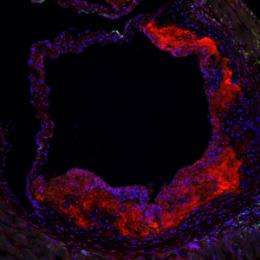Vitamin D may prevent clogged arteries in diabetics

People with diabetes often develop clogged arteries that cause heart disease, and new research at Washington University School of Medicine in St. Louis suggests that low vitamin D levels are to blame.
In a study published Nov. 9 in the Journal of Biological Chemistry, the researchers report that blood vessels are less like to clog in people with diabetes who get adequate vitamin D. But in patients with insufficient vitamin D, immune cells bind to blood vessels near the heart, then trap cholesterol to block those blood vessels.
"About 26 million Americans now have type 2 diabetes," says principal investigator Carlos Bernal-Mizrachi, MD. "And as obesity rates rise, we expect even more people will develop diabetes. Those patients are more likely to experience heart problems due to an increase in vascular inflammation, so we have been investigating why this occurs."
In earlier research, Bernal-Mizrachi, an assistant professor of medicine and of cell biology and physiology, and his colleagues found that vitamin D appears to play a key role in heart disease. This new study takes their work a step further, suggesting that when vitamin D levels are low, a particular class of white blood cell is more likely to adhere to cells in the walls of blood vessels.
Vitamin D conspires with immune cells called macrophages either to keep arteries clear or to clog them. The macrophages begin their existence as white blood cells called monocytes that circulate in the bloodstream. But when monocytes encounter inflammation, they are transformed into macrophages, which no longer circulate.
In the new study, researchers looked at vitamin D levels in 43 people with type 2 diabetes and in 25 others who were similar in age, sex and body weight but didn't have diabetes.
They found that in diabetes patients with low vitamin D—less than 30 nanograms per milliliter of blood—the macrophage cells were more likely to adhere to the walls of blood vessels, which triggers cells to get loaded with cholesterol, eventually causing the vessels to stiffen and block blood flow.
"We took everything into account," says first author Amy E. Riek, MD, instructor in medicine. "We looked at blood pressure, cholesterol, diabetes control, body weight and race. But only vitamin D levels correlated to whether these cells stuck to the blood vessel wall."
Riek and Bernal-Mizrachi say what's not yet clear is whether giving vitamin D to people with diabetes will reverse their risk of developing clogged arteries, a condition called atherosclerosis. They now are treating mice with vitamin D to see whether it can prevent monocytes from adhering to the walls of blood vessels near the heart, and they also are conducting two clinical trials in patients.
In one of those studies, the researchers are giving vitamin D to people with diabetes and hypertension to see whether the treatment may lower blood pressure. In the second study, African Americans with type 2 diabetes are getting vitamin D along with their other daily medications, and the research team is evaluating whether vitamin D supplements can slow or reverse the progression of heart disease.
Sometime in the next several months, the scientists hope to determine whether vitamin D treatment can reverse some of the risk factors associated with cardiovascular disease.
"In the future, we hope to generate medications, potentially even vitamin D itself, that help prevent the deposit of cholesterol in the blood vessels," Bernal-Mizrachi explains. "Previous studies have linked vitamin D deficiency in these patients to increases in cardiovascular disease and in mortality. Other work has suggested that vitamin D may improve insulin release from the pancreas and insulin sensitivity. Our ultimate goal is to intervene in people with diabetes and to see whether vitamin D might decrease inflammation, reduce blood pressure and lessen the likelihood that they will develop atherosclerosis or other vascular complications."
More information: Riek AE, Sprague JE, Timpson A, de las Fuentes L, Bernal-Mizrachi L, Schechtman KB, Bernal-Mizrachi C. Vitamin D suppression of endoplasmic reticulum stress promotes an anti-atherogenic monocyte/macrophage phenotype in type 2 diabetic patients. Journal of Biological Chemistry vol. 287 (46), pp. 38482-38494. Nov. 9, 2012 www.jbc.org/cgi/doi/10.1074/jbc.M112.386912















